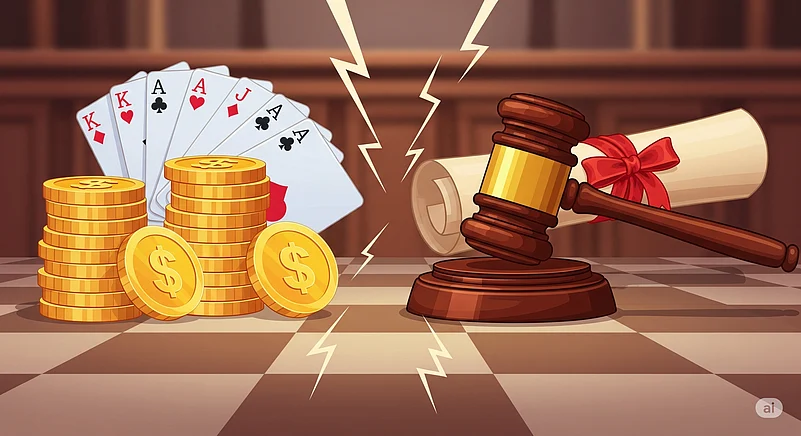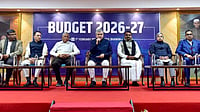
Blanket Ban: The Online Gaming Bill, 2025, imposes a nationwide prohibition on all real-money gaming (RMG) platforms, including fantasy sports, poker, rummy and lotteries, sparking strong opposition from industry bodies.
Legal Grounds: RMG firms are preparing court challenges on five fronts: vague definitions of RMGs, violation of constitutional rights (Articles 19(1)(g) and 19(1)(a)), arbitrary regulation breaching Article 14, federal overreach into state powers, and contradictions with existing IT Rules.
Industry and Political Pushback: The sector, valued at over ₹2 lakh crore and contributing ₹20,000 crore in taxes, argues the ban threatens jobs, startups and revenue. Karnataka’s IT Minister has publicly criticised the move as misguided and harmful.
Alternative Approach: Experts and industry leaders warn prohibition may drive users to offshore betting platforms, urging calibrated regulation—licensing, consumer safeguards and skill-chance distinction—over blanket restrictions.
With Parliament’s passage of the Promotion and Regulation of Online Gaming Bill, 2025, India’s real-money gaming (RMG) industry faces an existential threat. The law imposes a blanket ban on money-gaming services, their advertisements and transactions. Fantasy sports, poker, rummy, other card games and online lotteries all fall under the prohibition.
Industry bodies quickly appealed to Home Minister Amit Shah, calling the sector a “sunrise industry” worth over ₹2 lakh crore, with annual revenues of ₹31,000 crore, a tax haul of ₹20,000 crore and a projected doubling in size by 2028. With the Bill through the Lok Sabha, the real fight is likely to shift to the courts.
1. Blurry Definitions
The Bill divides gaming into two: e-sports, and “online money games” where players pay fees, stake valuables or deposit cash in the hope of winning money. This definition sweeps in both chance and skill, making the wager the only marker.
That breadth, say lawyers, could be its undoing. “The Bill’s definition of real-money gaming is broad and doesn’t clearly distinguish between games of skill and chance,” said Salman Waris of TechLegis LLC. “That could give RMG companies a strong ground to challenge the government. Due to broad drafting, the Bill risks unintentionally criminalising legitimate skill-based platforms like fantasy sports, which courts have often protected.”
2. Constitutional Rights
RMG companies will argue the ban violates Article 19(1)(g), the constitutional right to carry on a business. Courts have repeatedly upheld games of skill as legitimate enterprise.
“The most obvious one is Article 19(1)(g),” said Deepro Guha of The Quantum Hub, citing Supreme Court precedents including R.M.D. Chamarbaugwalla and K. Lakshmanan. “This Bill contravenes that. It says that whether you are a game of skill or chance does not matter—if you are an online money game, you are banned. That goes against judicial precedent and obliterates the skill-versus-chance distinction altogether.”
3. Arbitrary Regulation
The Bill bans RMGs but promotes e-sports and social games, a distinction experts call constitutionally suspect under Article 14’s guarantee of equality.
“Why allow online social games when FATF reports show that in-game purchases in such games have also been used for money laundering and terror financing? The logic of banning one category while allowing the others doesn’t hold up—it is arbitrary,” said Guha. He argued for licensing, consumer safeguards and responsible-gaming codes as alternatives to prohibition.
4. Political Pushback and Free Expression
Karnataka’s IT Minister quickly criticised the Bill on LinkedIn, warning of damage to a $4-billion industry that has generated ₹20,000 crore in taxes, created 2 lakh jobs and fostered 2,000 startups. “The rushed move to impose a blanket ban…will only drive over 40 crore users to illegal offshore platforms,” he wrote.
His argument reinforces another constitutional claim: free expression. Many platforms host games created by independent developers. “These games are a form of expression, and creators rely on such platforms to showcase their work,” said Guha. “By banning money games, the government removes the main platforms that sustain this ecosystem, contravening Article 19(1)(a).”
5. Centre vs States
The sharpest battle may centre on federalism. Gambling and betting fall under the State List. A central ban, argue lawyers, risks legislative overreach.
“The Centre derives powers mostly from this standalone legislation, with some reliance on the IT Act, which raises questions on its legal defensibility given States’ jurisdiction,” said Waris. The Supreme Court has upheld state powers on gambling, though games of skill occupy a grey area.
Guha noted that the Cabinet invoked Union List entries—such as national security and public health—to justify intervention. “The Union will argue this is a larger public-health issue. But RMG companies will certainly challenge this in court.”
Regulatory Contradictions
The Bill also collides with existing IT Rules, which had created a path for self-regulation. Unless withdrawn, the two regimes contradict one another.
Industry leaders warn prohibition could backfire. “Global experience shows calibrated regulation delivers better outcomes than blanket restrictions, which can unintentionally nudge users towards unregulated offshore platforms,” said Anuraag Saxena, CEO of the E-Gaming Federation. “Instead, a balanced approach that distinguishes skill from chance can build a transparent ecosystem that protects players and builds trust.”

































